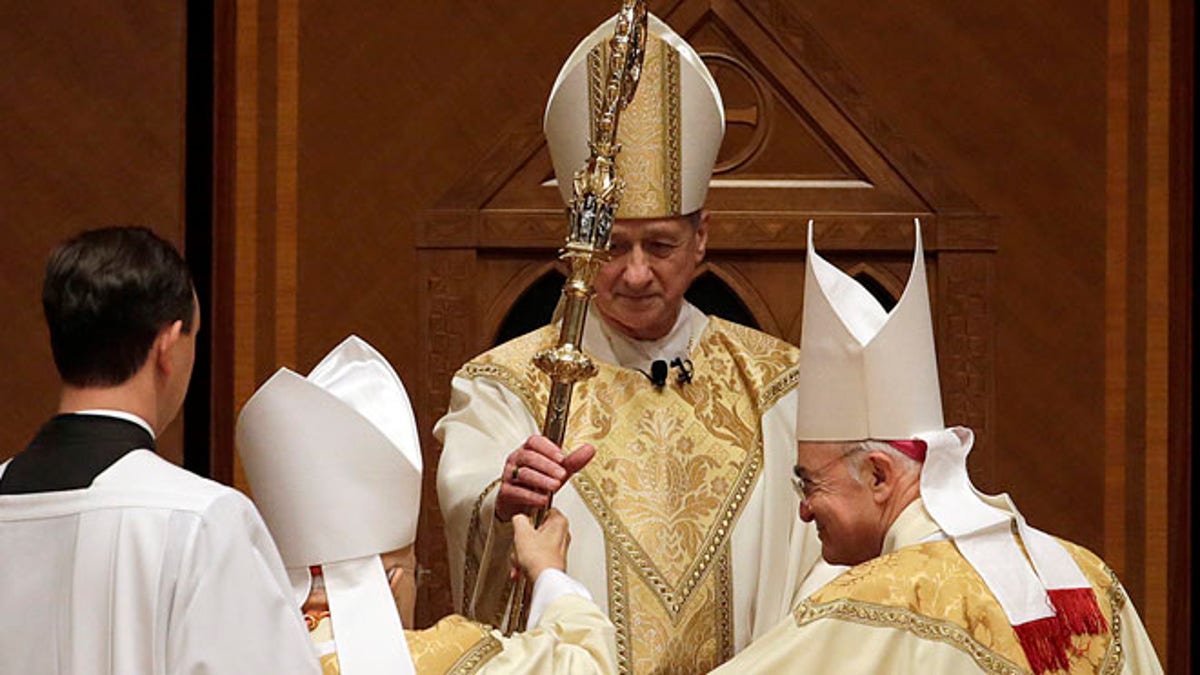
Nov. 18, 2014: The retiring Cardinal Francis George presents the crozier to the Archbishop Blase Cupich during his Installation Mass at Holy Name Cathedral in Chicago. (AP)
CHICAGO – Blase Cupich became the archbishop of Chicago on Tuesday after his predecessor handed him a bishop's staff and relinquished the chair that symbolizes the leadership of the nation's third-largest diocese.
During a Mass, the transfer of power was completed as Cardinal Francis George, who is retiring as he battles cancer, stepped aside after being the spiritual leader of more than 2 million Catholics since 1997.
The installation of the 65-year-old Cupich -- who was the bishop of the Diocese of Spokane, Washington, when he was selected by Pope Francis to succeed George -- marks the first time in the history of the Chicago archdiocese that a new archbishop will assume leadership while his predecessor is still alive.
In a ceremony Monday night steeped in tradition and symbolism, Cupich arrived at the Holy Name Cathedral -- crowded with hundreds of priests, religious leaders from several faiths and civic leaders -- and knocked on the door three times.
Those knocks, symbolic of his request to be admitted into the cathedral, set in motion a process that included a presentation of a garment called an archdiocesan stole that represents an invitation by the priests in the archdiocese to be the pastor.
The selection of the relatively low-profile Cupich to head the high-profile archdiocese is Pope Francis' first major mark on American Catholic leadership.
It also is seen as a message sent by the pope as he replaces George, a leading church conservative, with the more moderate Cupich. Observers say it is a signal that Francis wants a pastor to lead the archdiocese, someone who will follow his lead and emphasize mercy and ministering to the poor and create a church that is more welcoming.
In his homily Monday night during what is called a Rite of Reception, Cupich said he intends to ratchet down the rhetoric that has driven young people away from religion. And he vowed to take an active role in the community, pushing for immigration reform, taking part in the battle against gangs and gun violence, among other issues.
He voiced support for Pope Francis' call for leaders in the church to be pastors, and emphasized mercy and reaching out to people instead of just simply lecturing them, to openly communicate with those with whom the church might disagree.
"Jesus invites us, not only to take the risk of leaving our comfort zone, but also to deal with the tension involved in change, not dismissively but in a creative way," he said. "Pope Francis is giving voice to this invitation in our day... to leave behind the comfort of going the familiar way."
As he comes to an archdiocese that has shrunk in recent years and been forced to close schools amid declining enrolment, Cupich also spoke of the "formidable task of passing on the faith to the next generation" and his desire to bring young people back to the faith.

